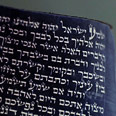
As in the preceding chapters, we find Moses addressing the Israelites. We are presented with a picture of a people on the verge of entry into the Land of Israel, and of Moses, aware of his fate – he will not lead the people into the Land of Israel; his life will end on Mount Nebo. In his address, Moses tries to reinforce the nation’s commitment to its covenant with God, the last covenant before entering the Land of Israel, the covenant to “observe faithfully all the terms of this Teaching” (Deuteronomy 32:46).
The parasha, expressed primarily in poetic form, begins with the words: “Give ear, O heavens, let me speak; Let the earth hear the words I utter!” (32:1). Moses calls upon heaven and earth to witness the covenant between God and Israel. The role of the heavens and of the earth in this covenant is that of witness.
Why the heavens and the earth?
Nachmanides notes that the heavens and the earth are the first things to be mentioned in the story of the Creation in Genesis. The heavens and the earth are the upper and lower limits of the world. Between them is man, born of the meeting of heaven and earth. As Franz Rosenzweig said, man was created to be God’s partner in creation. Human beings, through their actions, are called upon to use revelation to bring redemption and to realize the perfection of the world. Man has a duty to the earth – “to till it and tend it” (Genesis 2:15). It is the task of humankind to perfect creation by bringing harmony to heaven and earth.
Heaven and earth also serve as witnesses to the covenant between God and man, and define the space in which humanity fulfils that covenant. But heaven and earth also judge humanity’s conduct: “If, then, you obey the commandments that I enjoin upon you this day, loving the Lord your God and serving Him with all your heart and soul, I will grant the rain for your land in season, the early rain and the late. You shall gather in your new grain and wine and oil” (Deut. 11:13-14). And if not: “The Lord's anger will flare up against you, and He will shut up the skies so that there will be no rain and the ground will not yield its produce; and you will soon perish from the good land that the Lord is assigning to you” (11:17).
Rain in its season and a flourishing land show us that we are on the right path to fulfilling our role. But how far have we deviated from that today! Global warming, extinction, pollution, and more. There is no harmony between humanity and creation; heaven and earth are not in accord. We have strayed from the covenant. So far, we have failed to fulfill our duty to “tend it,” and it would be hard to maintain that we represent God’s will on earth. Heaven and earth judge us. They shout at us to turn around and return to our part in the covenant.
These are days of repentance. We review the sins that we have committed against our fellow human beings. We ask forgiveness and try to correct our behavior towards our family, our friends and our neighbors. We will also review the sins that we have committed against God, and Yom Kippur will bring forgiveness. Perhaps now is also the time to return to the covenant of Ha’azinu and to fulfill it. Perhaps we can repent for our sins and transgressions against heaven and earth – against the world itself, against the heavens that are the air that we breathe, and the earth that we till and that sustains us. If our place is between heaven and earth, let us reflect upon our relationship with the earth, and remember that true repentance changes us and repairs what we have done, it returns us to God’s path, and to harmony between heaven and earth.
Rabbi Debby Grinberg, rabbi of NOAM, the Masorti youth movement
The parasha courtesy of the Schechter Institute















